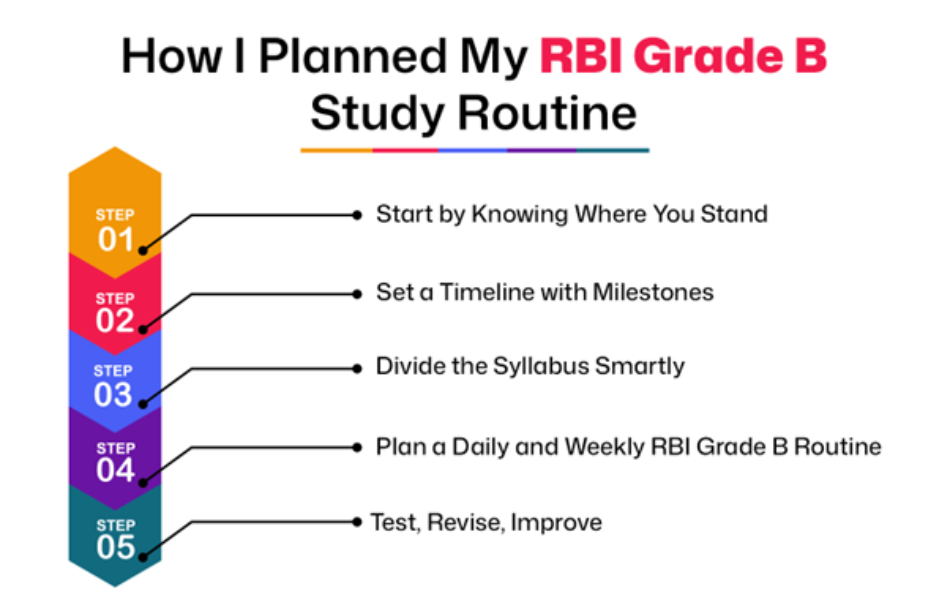How I Planned My RBI Grade B Study Routine

Sir, how should I plan my RBI Grade B study routine?
This is one of the most common questions I get from students and it’s a valid one. RBI Grade B is not like other exams. It’s competitive, vast, and slightly unpredictable if you don’t have a proper strategy. The mistake most students make is they skip the planning stage and start preparing right away. They keep jumping from one source to another, one subject to the next, and by the time they realise they need a structure, they’ve already lost crucial months.
Planning is not just about making a time table. It’s about understanding your strengths and weaknesses, setting realistic goals, choosing the right resources, and most importantly – sticking to the plan. Many students wait for motivation to strike before they start studying. But in exams like this, discipline always beats motivation. What you need is a simple, flexible routine that helps you stay consistent every day, without feeling burned out.
And that starts with clarity. Before you even make a routine, you need to understand the RBI Grade B syllabus inside out. You should know what’s expected from you in each phase, how deep you need to study each subject, and how much time each area might take. Once that’s clear, everything else including your study hours, revision plan, and test schedule, will automatically fall into place. To make this process easier, let me break it down for you step by step here.

Step 1: Start by Knowing Where You Stand
The first step is not studying but self-assessment. Ask yourself: Have you ever studied ESI or FM before? How good is your English writing? Is your general awareness up to date? Do you have clarity on basic quant, reasoning, and English concepts?
Spend two to three days just evaluating yourself. Go through the previous year papers, and try solving a few mock questions from each section. You don’t have to score well. The goal is to understand your current level and identify the areas that need the most work. Once you know your starting point, you get a different confidence as far as your preparation is concerned.
Step 2: Set a Timeline with Milestones
Every student’s journey is different. Some prepare with six months in hand, some only get three. Whatever your timeline is, break it down into monthly and weekly milestones. This gives your preparation a direction.
For example, if you have four months till the exam, you can plan the first two months for concept building, the third for revision and mocks, and the last for intense practice. You can make changes in this plan based on how strong your basics are. Just make sure your plan is flexible enough to adjust when real life gets in the way.
Step 3: Divide the Syllabus Smartly
Don’t treat all subjects the same. Divide your day according to the mindset required to study each subject. Quant and reasoning need active practice, so keep them for the time of day when your mind is fresh. General awareness and ESI need regular reading and note-making, which can be done when your energy is slightly low. FM and descriptive writing need conceptual clarity and practice, so treat them as serious subjects.
The idea is not to study everything every day but to touch each paper at least twice a week. Mix heavy and light subjects in your daily plan. For example, if you study FM and current affairs on Monday, go for quant and English the next day. This keeps you mentally balanced.
Step 4: Plan a Daily and Weekly RBI Grade B Routine
Once the bigger structure is in place, zoom in and create a realistic daily routine. Either you are a working professional or a full-time aspirant preparing just for RBI Grade B, I would advise you to give at least 4 to 6 hours daily. Within that time, set clear study slots.
Every Sunday, plan your week in advance. Make a rough list of topics you’ll cover, how many mock tests you’ll take, and what you’ll revise. This habit of weekly planning builds momentum and reduces stress.
Also, don’t forget to include buffer time. Some topics will take longer than expected, and you’ll need extra time to revise or catch up. If your plan is too rigid, you’ll lose confidence the moment something doesn’t go as scheduled.
Also, it is equally important to keep time for recreational activities and hobbies when you plan your weekly goals.
Step 5: Test, Revise, Improve
A study routine without testing is incomplete. Include one full mock test for Phase 1 every week after your first month, and start descriptive answer practice for Phase 2 as early as possible. Let me tell you something honestly, you can’t write perfect answers from day one, and we are not even aiming for that. The best way is to just start with one or two answers in a week, then gradually increase the frequency.
Use your test results to improve your routine. If you are consistently weak in reasoning, increase its share in your weekly plan. I believe, for most students, current affairs can be too much to revise at once, so it is advisable to revise it weekly instead of monthly.
Revision is not a separate phase. It should run parallel to your study plan. Keep revisiting important concepts and notes regularly so that you don’t forget what you studied earlier. Efficient revision results in effective retention.
Common Mistakes to Avoid
- Overplanning and under-executing: Elaborate schedules are useless if you are not following them.
- Skipping descriptive writing practice:Many students avoid doing it till the last month, which is a big risk.
- Neglecting revision: Reading once is not enough. You need to revise multiple times.
- Ignoring current affairs: Current Affairs for both Phase 1 and ESI in Phase 2 of the RBI Grade B exam can prove extremely crucial. Make daily notes or use monthly compilations, but be consistent.
Final Words of Advice
You don’t need a perfect plan. You need a plan that works for you. It should be practical, consistent, and flexible. Don’t copy someone else’s routine blindly. Understand your own learning style and build around that.
More than anything, stay patient. This exam is not cleared in a week or a month. It takes time. Some days you’ll feel low, and that’s okay. Just show up, follow your plan, and keep moving forward. Trust the process and trust yourself.
Your study routine is not just about passing an exam. It’s about becoming disciplined, focused, and confident. And once you build that mindset, no exam will ever feel out of reach.